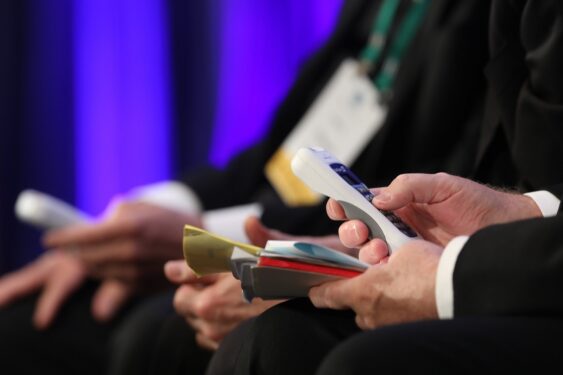
BALTIMORE — Last year’s United States Conference of Catholic Bishops fall meeting was marked by a discussion on pro-abortion politicians receiving Communion. There’s nothing on this year’s agenda that will garner the same attention, but there are plenty of action items that will impact the future of the U.S. Catholic Church.
At the top of the list for the meeting, which is taking place from Nov. 14-17, is the election of a new USCCB president and vice president on Nov. 15.
There will also be updates on the synod, National Eucharistic Revival, pro-life issues in light of the Supreme Court’s Dobbs decision this past summer, and immigration amid the ongoing crisis at the southern border.
The election of a new USCCB president and vice president come with the conclusion of three-year terms served by Archbishop José Gomez of Los Angeles as president and Archbishop Allen Vigneron of Detroit as his vice president. Normally, the vice president steps into the lead role at the end of the term, but it appears Archbishop Vigneron will step aside as he isn’t a listed nominee.
There are 10 candidates for the role. Many of them are well-known, and some have leadership positions within the USCCB and its committees. The candidates are as follows:
- Archbishop Timothy Broglio of the Military Services; the USCCB secretary.
- Bishop Michael Burbidge of Arlington.
- Bishop Frank Caggiano of Bridgeport, chair of the USCCB Subcommittee on Catechism (formerly an auxiliary bishop in the Diocese of Brooklyn).
- Archbishop Paul Coakley of Oklahoma City, chair of the USCCB Committee on Domestic Justice and Human Development.
- Archbishop Salvatore Cordileone of San Francisco, chair of the USCCB Committee on Laity, Marriage, Family Life and Youth.
- Archbishop Paul Etienne of Seattle.
- Bishop Daniel Flores of Brownsville, chair of the USCCB Committee on Doctrine.
- Archbishop Gustavo García-Siller of San Antonio.
- Archbishop William Lori of Baltimore, chair of the USCCB Committee on pro-life activities.
- Bishop Kevin Rhoades of Fort Wayne-South Bend.
The new USCCB president will be chosen by a simple majority vote. The vice president will be elected from the remaining nine candidates, also by a simple majority. They will serve three-year terms that will begin at the conclusion of the week’s general assembly.
Archbishop Gomez will give his final presidential address on the first day of the meeting.
Another vote on the agenda is whether to advance the causes for sainthood for three American women — Cora Evans, Michelle Duppong, and Mother Margaret Mary Healy Murphy.
Also on the agenda is a discussion on the USCCB voting guide for Catholics, “Forming Consciences for Faithful Citizenship.” The discussion will come just after the midterm elections, where issues central to the church — abortion and immigration among them — seemed to play a major part in the way people voted. The discussion will culminate in a vote on how best to reissue or redevelop the document, which hasn’t been changed since 2019.
Archbishop Lori, as the USCCB pro-life chair, will provide the update on pro-life issues in the post-Roe U.S., where abortion law is left to the states.
Auxiliary Bishop Mario Dorsonville, the outgoing USCCB Committee on Migration chair, will present on immigration. The Fiscal Year 2022 — Oct. 2021-Sept. 2022 — saw records set in terms of the number of migrants who arrived at the U.S.-Mexico border. Bishop Dorsonville and the committee have been outspoken on the need for immigration reform from Congress.
Another agenda item is an update on the Russia-Ukraine war from Archbishop Borys Gudziak of the Archeparchy of Philadelphia, who is president of the Ukrainian Catholic University in Lviv, Ukraine.
Bishop Flores will provide the synod update as the global initiative moves into the continental phase. And Bishop Andrew Cozzens, chair of the USCCB Committee on Evangelization, will provide an update on the National Eucharistic Revival, with the National Eucharistic Congress less than two years away.
There will also be chairmen-elect chosen for six USCCB committees — Canonical Affairs and Church Governance; Ecumenical and Interreligious Affairs; Evangelization and Catechesis; International Justice and Peace; Protection of Children and Young People; and Religious Liberty.
Each elected bishop will serve one year as chairman-elect before taking over the committee they’re elected to at the conclusion of next year’s fall meeting.
